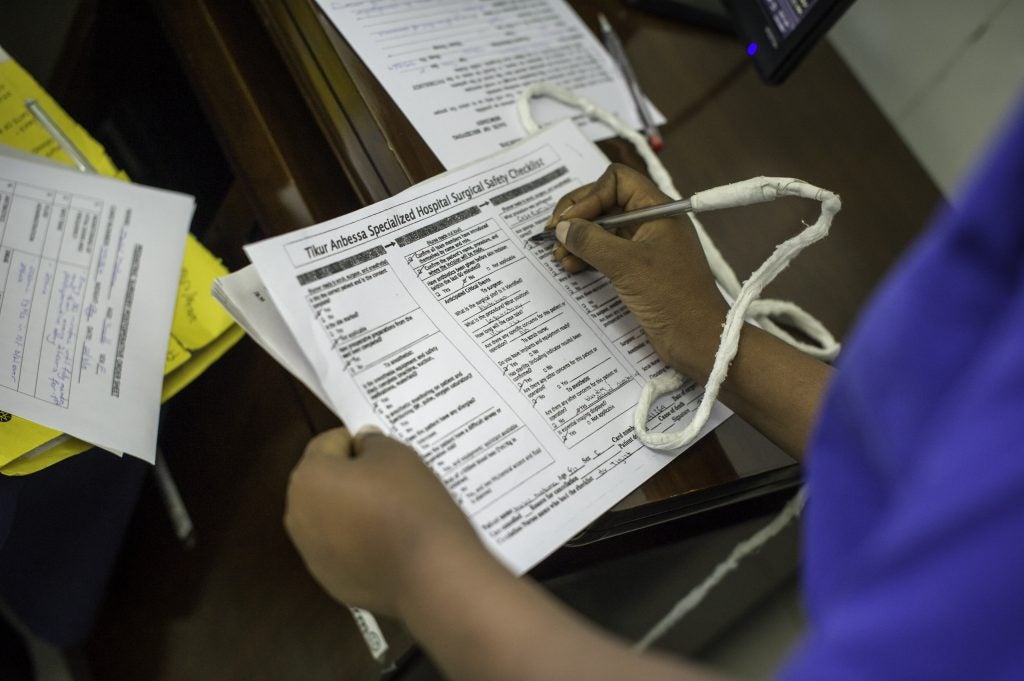New report finds widespread uptake and impact of the WHO Safe Surgery Checklist in its first decade and explores opportunities for the future
ADDIS ABABA/BOSTON/LONDON/NEW YORK, JANUARY 15, 2020 – Global safe-surgery non-profit Lifebox and health system innovation center Ariadne Labs announce the release of the “Checking in on the Checklist” report. The report and an accompanying series of studies show the global uptake of the World Health Organization (WHO) Surgical Safety Checklist in its first ten years since its launch and recommend ways the Checklist can be more effectively used to improve surgical safety for millions at risk.
The report found that uptake has been remarkably positive: the Checklist has been adopted in almost 90% of operating rooms in countries with a high Human Development Index (HDI), a country-level measure of health, education, and standard of living. It was referenced by at least 139 (70%) of the world’s countries and is included as a national standard by the health ministries of at least 20 countries. The Checklist has also had beneficial qualitative impact, introducing a culture of safety and improved communication within surgical teams, increasing patient trust, and improving job satisfaction. Furthermore, the report highlights the work that is still necessary to increase uptake in countries with lower HDIs.

In a related study published last week by Ariadne Labs and Lifebox in the British Journal of Surgery, worldwide Checklist use was found to be high: pooled analysis of international studies of more than 85,000 patients in 94 countries showed its use in 75% of operations globally in 2014-2016. However, significant variability was found, with lower Checklist use in countries of low HDI, for certain types of surgeries (lower for obstetrics and gynecology than abdominal), and where the predominant language is not one of the six official WHO languages (Arabic, Chinese, English, French, Russian, Spanish).
“The uptake of the WHO Surgical Safety Checklist in just ten years is a significant global health success story,” says Dr. Atul Gawande, surgeon and writer who, together with clinicians and global health professionals, launched the one-page Checklist to improve surgical safety. “I am stunned to see how rapidly and enthusiastically the Checklist has been adopted. There is no single remedy to ensure safe surgery for all, but a simple, low-cost, high-impact tool like the Checklist helps make sure every person can get the right care everywhere, every time.”
Inspired by safety checklists used in other high-risk industries like aviation and nuclear power, the 19-item WHO Surgical Safety Checklist was designed to decrease human errors and increase teamwork and communication in the operating room. Effective Checklist use was found to be associated with a decrease in death rates of nearly 50%.
Based on lessons learned over the past decade, the “Checking in on the Checklist” report makes key recommendations to boost and sustain Checklist uptake, especially in resource-constrained settings: getting buy-in from local medical leaders and surgical team members; adapting the Checklist to local needs including language translation and modification to fit local practices and resources; and maintaining support by top-down management and bottom-up staff to ensure that the Checklist is indeed being used.
“As one of the only pediatric surgeons in Ethiopia, the WHO Surgical Safety Checklist is essential for me and my team,” said Dr. Tihitena Negussie of Black Lion Hospital, Addis Ababa, Ethiopia. “Every surgical procedure we perform needs to be as safe as possible—there is a life at stake—and the Checklist helps us make sure we communicate, follow best practices, and reduce the chances of mistakes and causes of infection as much as possible. It is a simple tool, but it saves lives.”
****
Checking in on the Checklist: https://www.lifebox.org/checkinginonthechecklist/
Executive Summary: https://www.lifebox.org/checkinginonthechecklist/executive-summary/
About Lifebox
Lifebox is a nonprofit organization working to improve the safety of surgery and anesthesia in low- and middle-income countries. Lifebox was founded in 2011 by the Association of Anaesthetists of Great Britain & Ireland, Brigham and Women’s Hospital, the Harvard T.H. Chan School of Public Health, and the World Federation of Societies of Anaesthesiologists.
About Ariadne Labs
Ariadne Labs is a joint health systems innovation center at Brigham and Women’s Hospital and the Harvard T.H. Chan School of Public Health. Founded in 2012, Ariadne Labs is home to the Safe Surgery & Safe Systems Program.
Contact:
Oliver Yun, oliveryun@gmail.com, +1-650-443-8172
Kris Torgeson, kris@lifebox.org, +1 646 457 5695
Jim Sachetta, jsachetta@ariadnelabs.org, +1-774-274-2794


